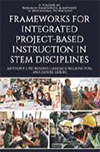
Frameworks for Integrated Project-Based Instruction in STEM Disciplines
By:
Anthony J. Petrosino, The University of Texas at Austin (Emeritus) and Southern Methodist University
Candace Walkington, Southern Methodist University
Denise Ekberg, UTeach Natural Sciences (Retired)
A volume in the series: Research, Innovation & Methods in Educational Technology. Editor(s): Chrystalla Mouza, University of Delaware. Nancy C. Lavigne, University of Delaware.
Published 2024
Frameworks for Integrated Project-Based Instruction in STEM Disciplines presents an original approach to Science, Technology, Engineering, and Mathematics (STEM) centric project based instruction. We approach project based instruction from an engineering design philosophy and the accountability highlighted in a standards-based environment. We emphasize a backward design that is initiated by well-defined outcomes tied to local, state, or national standards that provide teachers with a framework guiding students' design, solving, or completion of ill-defined tasks. In project-based STEM classrooms students investigate, utilize technological tools, construct artifacts, participate in debates, collaborate, and make products to demonstrate what they have learned.
Features include deep coverage of four topics in PBI: scaffolding, student-driven inquiry, driving questions, and development of lessons based on national and state standards. This focus will ensure a deep understanding by the reader of project-based instruction, which will allow the reader to create strong and meaningful lesson experiences for their students. An emphasis on student-driven inquiry will be discussed, including the importance of giving students the cognitive tools, such as statistical analysis tools, they need to research and inquire about the lesson topic. A breakdown of what a successful driving question includes will be explained, and examples given. The book will include strategies for starting the lesson process with ending goals in mind by creating driving questions and breaking down state and national standards. This book is strongly rooted in research in the learning sciences about project-based instruction, but will also be designed to be practically useful to teachers and teacher educators and researchers by bridging research and practice.
CONTENTS
Preface. Acknowledgements. CHAPTER 1: What is PBI. CHAPTER 2: Linking the History of the “Project Method” to Current PBI Movements. CHAPTER 3: Six Major Elements of PBI. CHAPTER 4: Putting Your Project Together. CHAPTER 5: PBI Across Engineering, Computer Science, and Mathematics. CHAPTER 6: Practical Implementation of PBI at Scale: Administration and Assessment. CHAPTER 7: The Future of PBI Curricula: Issues of Technology and Community. About the Authors.
-
Paperback979-8-88730-367-3
Web price: $45.04 (Reg. 52.99)
-
Hardcover979-8-88730-368-0
Web price: $80.74 (Reg. 94.99)
- eBook979-8-88730-369-7

- EDU050000 - EDUCATION: Collaborative & Team Teaching
- EDU007000 - EDUCATION: Curricula
- EDU029000 - EDUCATION: TEACHING METHODS & MATERIALS: General
-
 Constructivist Instructional Design (C-ID)
Foundations, Models, and Examples
Constructivist Instructional Design (C-ID)
Foundations, Models, and Examples
-
 Evaluating Electronic Portfolios in Teacher Education
Evaluating Electronic Portfolios in Teacher Education
-
 Evaluating Technology in Teacher Education
Lessons From the Preparing Tomorrow’s Teachers for Technology (PT3) Program
Evaluating Technology in Teacher Education
Lessons From the Preparing Tomorrow’s Teachers for Technology (PT3) Program
-
 Preparing Pre-Service Teachers to Teach Computer Science
Models, Practices, and Policies
Preparing Pre-Service Teachers to Teach Computer Science
Models, Practices, and Policies
-
 Professional Development for In-Service Teachers
Research and Practices in Computing Education
Professional Development for In-Service Teachers
Research and Practices in Computing Education
-
 Research on Technology in English Education
Research on Technology in English Education
-
 Research on Technology in Social Studies Education
Research on Technology in Social Studies Education

